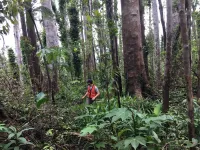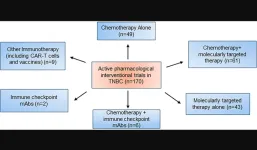(Press-News.org) Research led by scientists at UCLA Jonsson Comprehensive Cancer Center found that responses to a type of immunotherapy called PD-1 checkpoint blockade in patients with advanced melanoma depended on whether or not they had previously received another immunotherapy – CTLA-4 blockade – as well as other factors.
Their findings, based on analysis of seven data sets generated over the past decade, which included results of tumor biopsies from more than 500 patients, are published in Cancer Cell.
“In our large set of data, features that have been used to predict response to anti-PD-1 checkpoint blockade therapy – often called biomarkers –related to the presence of certain immune cell types in the tumor and the genetic profile of the tumors themselves were modified by a patient’s treatment history,” said lead author Katie Campbell, PhD, a postdoctoral fellow in hematology/oncology at UCLA Jonsson Comprehensive Cancer Center.
When a patient is diagnosed with advanced melanoma, they usually are treated with immune therapies like anti-PD-1 blockade and anti-CTLA-4 blockade, in combination or alone. By blocking different proteins that diminish the effectiveness of T cells, these checkpoint inhibitors enhance the body’s immune response to cancer.
“As translational scientists, when we work with clinicians, one of the goals is to think about how biomarkers can be used to inform clinical benefit. If we can predict which patients are or are not going to respond to therapy from studying their biopsies, we can start to more strategically define which therapies or combinations of therapies should be used and when,”
“Since the current treatment paradigm for melanoma involves combinations or sequential use of immune checkpoint therapies, our study supports how these therapies may work together to effectively treat melanoma. It also highlights the importance of a patient’s prior treatment history as a modifying factor to consider when planning a treatment strategy,” said co-senior author Dr. Antoni Ribas, director of the Tumor Immunology Program at UCLA Jonsson Comprehensive Cancer Center and the Parker Institute for Cancer Immunotherapy Center at UCLA.
Although immunotherapy is becoming increasingly common in treating late-stage cancers, most studies on biomarkers and factors determining effectiveness are based on small series of samples. Therefore, the multidisciplinary and multicenter research team set out to assemble and harmonize a large set of tumor and clinical data from patients with melanoma to identify key factors associated with treatment response.
“The cohesive processing of clinical data sets requires collaboration among experts with knowledge in computer science, statistics, biology, immunotherapy, informatics, and translational and clinical medicine. We undertook this project to establish a resource for other researchers, with the goal of identifying statistically significant correlates of melanoma responses to anti-PD-1 therapy,” Campbell said.
“As we performed the analyses, the greatest differences were seen when we accounted for a patient’s prior treatment with anti-CTLA-4 blockade,” she added. “the context in which a biopsy is collected needs to be considered to better define how biomarkers should be implemented in the clinical setting.”
The researchers said that by processing the DNA and RNA sequencing data from hundreds of patients on one cohesive pipeline, they were able to control for some of the wide range of differences that exist across patients, tumors and treatment histories. They also considered clinical demographics that may be important for understanding why a patient did or did not respond to anti-PD-1 blockade therapy.
Although the results do not specifically explain how or when to clinically apply the biomarker information, they provide a foundation and a road map.
Authors In addition to lead author Campbell and co-senior author Ribas, both of whom are corresponding authors, co-senior authors include Christine Spencer and Daniel Wells from the Parker Institute for Cancer Immunotherapy in San Francisco. Campbell cooperatively led this study with Meelad Amouzgar, from Stanford University and the Parker Institute for Cancer Immunotherapy. The complete list of contributing authors and institutions is included with the published article.
Acknowledgements: The authors would like to acknowledge Bristol Myers Squibb and the REVIVE program at the Parker Institute for supporting this study through both the contribution of previously unpublished data and funding support. This study is an example of the power of collaboration between academic medical centers (UCLA), non-profit research institutions (PICI) and biopharma (BMS) to bring benefit to patients.
Funding Several authors receive grants from the National Institutes of Health, including the National Cancer Institute. Ribas is supported by NIH grants R35 CA197633 and P01 CA167575, the Parker Institute for Cancer Immunotherapy, and the Ressler Family Fund. He also receives support from Ken and Donna Schultz, and Thomas Stutz. Campbell is supported by the Cancer Research Institute Irvington Postdoctoral Fellowship Program, the V Foundation Gil Nickel Melanoma Research Fellowship, and the Parker Institute for Cancer Immunotherapy (PICI) and V Foundation Bridge Fellows Program. A full list of funding sources is provided with the article.
Authors’ competing interests are published with the Cancer Cell article.
Article: Prior anti-CTLA-4 therapy impacts molecular characteristics associated with anti-PD-1 response in advanced melanoma, Cancer Cell, Volume 41, Issue 4, 10 April 2023, Pages 791-806.e4, DOI: 10.1016/j.ccell.2023.03.010
END
Prior treatments influence immunotherapy response in advanced melanoma
Findings may help scientists create more precise future treatments and predict which patients will benefit most from current immune checkpoint blockade
2023-04-10
ELSE PRESS RELEASES FROM THIS DATE:
Trees in areas prone to hurricanes have strong ability to survive even after severe damage
2023-04-10
As their plane flew low on its approach to land at the airport on the island of Dominica, researchers from Clemson and Harvard universities looked out the window to see miles of forests with trees that looked like matchsticks.
It was nine months after the island in the West Indies had taken a direct hit from Category 5 Hurricane Maria.
But when the researchers actually got into the forests and examined the trees more closely, they discovered that while 89% of the trees sustained damage — 76% of which had major damage —only 10% were immediately killed. Many of the trees had resprouted.
“These ...
Roundtable on community engagement in data decision-making
2023-04-10
A Roundtable Discussion was recently held to discuss the importance of community voice in developing 21st century public health systems. Expert panelists emphasized the need to redefine measures, foster new ideas, and work to ensure that historically excluded populations are represented in the data collection process. The Roundtable transcript is now published in the peer-reviewed journal Big Data. Click here to read the transcript.
The discussion was moderated by Michael Crawford, Associate Dean for Strategy, ...
Temperature is stronger than light and flow as driver of oxygen in US rivers
2023-04-10
UNIVERSITY PARK, Pa. — The amount of dissolved oxygen in a river is a matter of life or death for the plants and animals living within it, but this oxygen concentration varies drastically from one river to another, depending on their unique temperature, light and flow. To better understand which factor has the greatest impact on the concentration of dissolved oxygen, researchers at Penn State used a deep learning model to analyze data from hundreds of rivers across the United States.
Oxygen concentration is an important measure of water quality because fish and other aquatic organisms require dissolved oxygen to breathe, according to Wei Zhi, assistant ...
Crosstalk between triple negative breast cancer and microenvironment
2023-04-10
“[...] the study of immunotherapy for treating triple negative breast cancer might still be at its early stages of development but is full of future promise.”
BUFFALO, NY- April 10, 2023 – A new review paper was published in Oncotarget's Volume 14 on March 31, 2023, entitled, “Crosstalk between triple negative breast cancer and microenvironment.”
Although many advances have been made in the treatment of breast cancer, for triple negative breast cancer (TNBC) these therapies have not significantly increased overall survival. Tumor microenvironment (TME) plays an essential role to develop and control TNBC progression. ...
Fish-inspired, self-charging electric battery may help power space applications
2023-04-10
UNIVERSITY PARK, Pa. — A research lab at Penn State will equally share a three-year, $2.55 million grant from the Air Force Office of Scientific Research (AFOSR) with three other teams at Carnegie Mellon University and the Adolphe Merkle Institute of the University of Fribourg in Switzerland. The multidisciplinary research collaboration aims to develop a framework for the design and production of soft, self-charging, bio-inspired power sources for applications in space.
Joseph Najem, assistant professor of mechanical engineering at Penn State, will lead ...
Rice U. engineering students aim to shed better light on surgeries
2023-04-10
HOUSTON – (April 10, 2023) – Improving lighting in the operating room could cut the duration of some surgeries by as much as 25%, according to Dr. Munish Gupta, an orthopedic spine surgeon at Washington University in St. Louis.
With that in mind, he tasked Rice University engineering students on the OR Lights team — Ellice Gao, Bryn Gerwin, Justin Guilak, Rosemary Lach, Renly Liu and Hemish Thakkar — with building a tunable lighting system that allows surgeons to better illuminate their working ...
Easy and quick binding of targeting molecule and radiotracer to drug nanocarrier for cancer therapy
2023-04-10
BIRMINGHAM, Ala. – An ideal nanovesicle to fight cancer would have three functionalities: 1) a precision-targeting molecule to preferentially bind it to surface markers on cancer cells, 2) a strongly bound radionuclide signal that would allow a PET scan to locate the vesicles in the body, and 3) the ability to carry and release a drug treatment, such as a chemotherapy, at the cancer tumor.
It would also meet two other requirements — having a simple and facile method of manufacture, and being biocompatible and biodegradable in the body.
A University of Alabama at Birmingham team has now described a tiny polymersome that — in initial preclinical ...
SPOILER ALERT: Condolences to the fans of Logan Roy patriarch of HBO’s Succession
2023-04-10
DALLAS, April 10, 2023 — The American Heart Association sends fans of the two-time Emmy Award winning best drama series “Succession” our heartfelt condolences following the sudden cardiac death that killed off main character, Logan Roy, played by Brian Cox.
(SPOILER ALERT) Those who watched last night’s episode on HBO in stunned silence, saw patriarch businessman Logan suffer a cardiac arrest while on a plane as his eldest son, Connor, celebrated his wedding. Logan’s other three children ...
Purdue receives $1 million USDA grants for sustainable agriculture projects
2023-04-10
Purdue receives $1 million USDA grants for sustainable agriculture projects
WEST LAFAYETTE, Ind. — Purdue University has received two grants of $1 million each from the U.S. Department of Agriculture’s National Institute of Food and Agriculture for five-year projects to enhance sustainable agricultural systems.
One grant is part of a $10 million project led by Michigan State University’s Brent Ross to develop more resilient food systems for coping with multiple ...
Light pollution may extend mosquitoes’ biting season
2023-04-10
COLUMBUS, Ohio – A new study’s finding that urban light pollution may disrupt the winter dormancy period for mosquitoes that transmit West Nile virus could be considered both good news and bad news.
The good news is that the disease-carrying pests may not survive the winter if their plans to fatten up are foiled. The bad news is their dormancy period, known as diapause, may simply be delayed – meaning they’re biting humans and animals longer into the fall.
“We see the highest levels ...
LAST 30 PRESS RELEASES:
SfN announces Early Career Policy Ambassadors Class of 2026
Spiritual practices strongly associated with reduced risk for hazardous alcohol and drug use
Novel vaccine protects against C. diff disease and recurrence
An “electrical” circadian clock balances growth between shoots and roots
Largest study of rare skin cancer in Mexican patients shows its more complex than previously thought
Colonists dredged away Sydney’s natural oyster reefs. Now science knows how best to restore them.
Joint and independent associations of gestational diabetes and depression with childhood obesity
Spirituality and harmful or hazardous alcohol and other drug use
New plastic material could solve energy storage challenge, researchers report
Mapping protein production in brain cells yields new insights for brain disease
Exposing a hidden anchor for HIV replication
Can Europe be climate-neutral by 2050? New monitor tracks the pace of the energy transition
Major heart attack study reveals ‘survival paradox’: Frail men at higher risk of death than women despite better treatment
Medicare patients get different stroke care depending on plan, analysis reveals
Polyploidy-induced senescence may drive aging, tissue repair, and cancer risk
Study shows that treating patients with lifestyle medicine may help reduce clinician burnout
Experimental and numerical framework for acoustic streaming prediction in mid-air phased arrays
Ancestral motif enables broad DNA binding by NIN, a master regulator of rhizobial symbiosis
Macrophage immune cells need constant reminders to retain memories of prior infections
Ultra-endurance running may accelerate aging and breakdown of red blood cells
Ancient mind-body practice proven to lower blood pressure in clinical trial
SwRI to create advanced Product Lifecycle Management system for the Air Force
Natural selection operates on multiple levels, comprehensive review of scientific studies shows
Developing a national research program on liquid metals for fusion
AI-powered ECG could help guide lifelong heart monitoring for patients with repaired tetralogy of fallot
Global shark bites return to average in 2025, with a smaller proportion in the United States
Millions are unaware of heart risks that don’t start in the heart
What freezing plants in blocks of ice can tell us about the future of Svalbard’s plant communities
A new vascularized tissueoid-on-a-chip model for liver regeneration and transplant rejection
Augmented reality menus may help restaurants attract more customers, improve brand perceptions
[Press-News.org] Prior treatments influence immunotherapy response in advanced melanomaFindings may help scientists create more precise future treatments and predict which patients will benefit most from current immune checkpoint blockade






